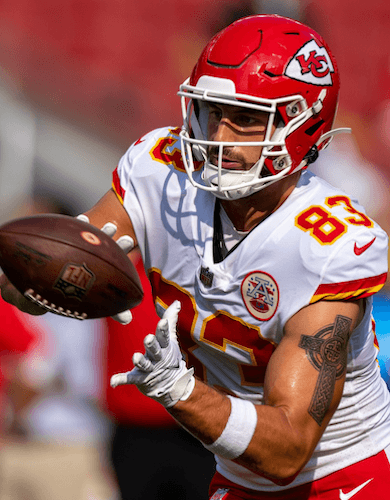
Multi-talented star Usher and NFL champion Noah Gray of the Kansas City Chiefs are helping to shine a much-needed spotlight on type 1 diabetes (T1D) during the 2024 NFL Super Bowl LVIII.
Usher Turns up the Volume on T1D
As Usher was preparing for his highly-anticipated Super Bowl Halftime show and album release, he was also using his platform to raise awareness about type 1 diabetes (T1D) and the importance of screening. In several media interviews leading up to the big event, he shared his personal journey as a T1D parent. He talked about his now teenage son’s diagnosis at the age of six, emphasizing the need for more understanding of T1D and early detection.
Noah Gray, A T1D Champion on and off the Football Field
Noah Gray, a standout tight end for the Kansas City Chiefs, was diagnosed with T1D during his freshman year at Duke University. Despite the life-changing diagnosis, he remained determined to pursue his dreams. He learned how to manage his T1D and the highs and lows effectively and continued to excel academically and athletically.
University. Despite the life-changing diagnosis, he remained determined to pursue his dreams. He learned how to manage his T1D and the highs and lows effectively and continued to excel academically and athletically.
Noah’s perseverance paid off when he was selected by the Kansas City Chiefs in the 2021 NFL draft. He further cemented his place in the league, playing a pivotal role in the Chiefs’ victory at the 2023 Super Bowl LVII against the Philadelphia Eagles, before setting his eyes on adding another ring to his collection this year.
Noah is a shining example of how individuals with T1D can excel in sports at any level, thanks to T1D research advancements and breakthrough therapies and technologies to help manage the disease. He is a champion on and off the football field who has been raising awareness and sharing his story to inspire other T1D youth and fellow athletes since college. His empowering message encourages people with T1D to speak openly and never be afraid to share their diagnosis. He also urges T1D youth and adults to prioritize managing the condition and seek support whenever needed.
Breakthrough T1D T1Detect Education and Awareness Program for T1D Risk
Type 1 diabetes screening involves a blood test to check for pancreatic islet autoantibodies associated with the disease, enabling families to plan, prepare, and prevent life-threatening complications like diabetic ketoacidosis (DKA) and hospitalization at the time of diagnosis. Early detection also opens the opportunity to possibly benefit from therapies that delay the onset of T1D or enroll in studies where other innovative therapeutic options may be available.
T1Detect, Breakthrough T1D’s education and awareness program for T1D risk screening, provides information about where to get screened and important resources that are available after the results are received.
Visit JDRF.org/T1Detect to learn more.